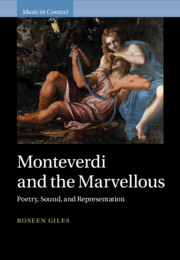Book contents
- Monteverdi and the Marvellous
- Music in Context
- Monteverdi and the Marvellous
- Copyright page
- Dedication
- Contents
- Illustrations
- Music Examples
- Acknowledgements
- Introduction
- 1 The Sound of the Marvellous
- 2 Marino and the Rime boscherecce
- 3 Monteverdi’s Contradictory Kisses
- 4 Il bacio mordace: Of Kissing and Biting
- 5 Tasso and the Music of Epic
- 6 Monteverdi’s Earliest Laments
- Bibliography
- Index
1 - The Sound of the Marvellous
Published online by Cambridge University Press: 10 October 2023
- Monteverdi and the Marvellous
- Music in Context
- Monteverdi and the Marvellous
- Copyright page
- Dedication
- Contents
- Illustrations
- Music Examples
- Acknowledgements
- Introduction
- 1 The Sound of the Marvellous
- 2 Marino and the Rime boscherecce
- 3 Monteverdi’s Contradictory Kisses
- 4 Il bacio mordace: Of Kissing and Biting
- 5 Tasso and the Music of Epic
- 6 Monteverdi’s Earliest Laments
- Bibliography
- Index
Summary
Is it possible to hear marvels? Despite its deep roots in Aristotelian thought, the marvellous, or meraviglia in Italian, was a highly contested subject in early modern literary circles. It is most often associated with Giambattista Marino (1569–1625), the poet who infamously declared that the aim of poetry was, above all else, to arouse wonder. The primacy of wonderment as an artistic aim did not, however, begin with Marino. Not only does the idea permeate criticism throughout the second half of the sixteenth century, particularly in the writings of Francesco Patrizi (1529–97), but it was by no means restricted to the art of poetry alone. This chapter focuses on the origins of meraviglia in the work of classical writers, its centrality to literary debates in the sixteenth century, and its reimagining in the poetry, painting, and sculpture of the early seventeenth century.
Keywords
- Type
- Chapter
- Information
- Monteverdi and the MarvellousPoetry, Sound, and Representation, pp. 12 - 40Publisher: Cambridge University PressPrint publication year: 2023

